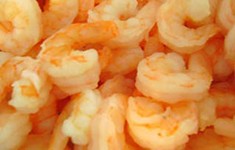The U.S. De partment of Commerce (DOC) issued its final determination Tuesday on whether the governments of seven countries — China, India, Ecuador, Indonesia, Malaysia, Thailand and Vietnam — subsidized shrimp exports to the U.S., and results for two of those nations came as a surprise.
partment of Commerce (DOC) issued its final determination Tuesday on whether the governments of seven countries — China, India, Ecuador, Indonesia, Malaysia, Thailand and Vietnam — subsidized shrimp exports to the U.S., and results for two of those nations came as a surprise.
In a preliminary report on 29 May, the DOC said five of the countries had issued actionable government subsidies, including Thailand, at a rate of 1.75 to 2.09 percent. The DOC said at the time that Ecuador had issued no subsidies that warranted countervailing action.
But on 13 August, the DOC changed its mind, determining Thailand had issued no subsidies warranting U.S. action, and that Ecuador had subsidized some of its shrimp companies, at rates ranging from 10.13 to 13.51 percent. For the other nations, the DOC determined there were actionable government subsidy rates of 18.16 percent for China; 10.54 to 11.14 percent for India; 10.80 to 54.50 percent for Malaysia and 1.15 to 7.88 percent for Vietnam.
Along with Thailand, the DOC determined Indonesia had set no actionable duties, and considers the investigation into both those countries closed.
Under U.S. law, the American government can issue countervailing import duties on products that are being unfairly subsidized by the exporting country’s government.
After the Coalition of Gulf Shrimp Industries (COGSI), a domestic shrimp industry group, issued a petition charging that the seven nations were using subsidies for their respective shrimp industries to undercut domestic producers in the U.S., the DOC opened the investigation that led to Tuesday’s report.
After issuing its report, the DOC has set new countervailing duty rates for India, China, Malaysia, Ecuador and Vietnam, rates that go on the books officially when the latest issue of the federal register comes out next week.
However, the U.S. International Trade Commission (ITC) must now determine what, if any, financial damage has been done to the domestic shrimp industry by those five nations. The ITC is expected to announce its findings on 19 September, and if the level of hardship demands a different relief from what the DOC has set, the new countervailing duties could change, or go away altogether.
COGSI, in a statement, thanked the DOC for its report.
“We appreciate these robust numbers from the Commerce Department,” said David Veal, COGSI’s executive director. “Clearly, our industry faces a real threat from the billions of dollars of illegal subsidies from these five nations.”
 partment of Commerce (DOC) issued its final determination Tuesday on whether the governments of seven countries — China, India, Ecuador, Indonesia, Malaysia, Thailand and Vietnam — subsidized shrimp exports to the U.S., and results for two of those nations came as a surprise.
partment of Commerce (DOC) issued its final determination Tuesday on whether the governments of seven countries — China, India, Ecuador, Indonesia, Malaysia, Thailand and Vietnam — subsidized shrimp exports to the U.S., and results for two of those nations came as a surprise.In a preliminary report on 29 May, the DOC said five of the countries had issued actionable government subsidies, including Thailand, at a rate of 1.75 to 2.09 percent. The DOC said at the time that Ecuador had issued no subsidies that warranted countervailing action.
But on 13 August, the DOC changed its mind, determining Thailand had issued no subsidies warranting U.S. action, and that Ecuador had subsidized some of its shrimp companies, at rates ranging from 10.13 to 13.51 percent. For the other nations, the DOC determined there were actionable government subsidy rates of 18.16 percent for China; 10.54 to 11.14 percent for India; 10.80 to 54.50 percent for Malaysia and 1.15 to 7.88 percent for Vietnam.
Along with Thailand, the DOC determined Indonesia had set no actionable duties, and considers the investigation into both those countries closed.
Under U.S. law, the American government can issue countervailing import duties on products that are being unfairly subsidized by the exporting country’s government.
After the Coalition of Gulf Shrimp Industries (COGSI), a domestic shrimp industry group, issued a petition charging that the seven nations were using subsidies for their respective shrimp industries to undercut domestic producers in the U.S., the DOC opened the investigation that led to Tuesday’s report.
After issuing its report, the DOC has set new countervailing duty rates for India, China, Malaysia, Ecuador and Vietnam, rates that go on the books officially when the latest issue of the federal register comes out next week.
However, the U.S. International Trade Commission (ITC) must now determine what, if any, financial damage has been done to the domestic shrimp industry by those five nations. The ITC is expected to announce its findings on 19 September, and if the level of hardship demands a different relief from what the DOC has set, the new countervailing duties could change, or go away altogether.
COGSI, in a statement, thanked the DOC for its report.
“We appreciate these robust numbers from the Commerce Department,” said David Veal, COGSI’s executive director. “Clearly, our industry faces a real threat from the billions of dollars of illegal subsidies from these five nations.”





